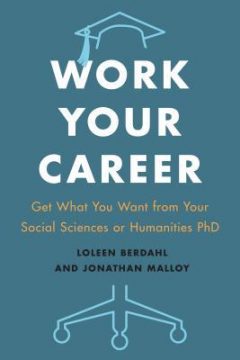Book Review: Work Your Career

Work Your Career
Get What You Want from Your Social Sciences or Humanities PhD
By Loleen Berdahl and Jonathan Malloy
University of Toronto Press, 2018
The subtitle of Work Your Career may suggest that it is written primarily for humanities and social science PhD students. Though the discussion of career development focuses on issues pertinent to this specific group, the book does contain valuable information relevant to scholars from all disciplines, including postdoctoral researchers. A quick glance at the chapter titles is enough to indicate that at least some of the material could benefit a wider audience. There is, for instance, a chapter on “Establishing Your Funding Record,” one on how to “Cultivate a Professional Reputation,” and another about how to “Approach Academic Jobs Strategically.” While humanities and social science PhDs stand to benefit the most from reading Work Your Career, others are sure to be pleasantly surprised by the bits of seemingly basic yet powerful pieces of advice dispensed throughout the book.
For the book’s target audience, two chapters in particular are noteworthy: “Work Your Program” and “Go Beyond Your Program.” These two chapters contain indispensable tips such as how selecting certain assignment and dissertation topics can help advance one’s career goals. They also contain a discussion of how to weigh the gains from engaging in professional development activities outside of one’s academic program. Perhaps the most salient piece of advice is embedded in the overarching theme: even typical academic activities—those which graduate students perform in order to fulfill degree requirements—can/should be viewed through the lens of professional development and career goals. The suggestion is that everything graduate students do—including “purely academic exercises”—can be leveraged to serve larger career goals, be they within academia or in the broader job market. This spirit is also evident in the section titles which are presented as questions (“How do I select the best courses to advance my future career?”), thus replicating a central facet of graduate training: we must ask the right questions if we hope to reach interesting and valuable answers.
Work Your Career is organized chronologically—it starts with questions to consider when selecting a graduate program and ends with venturing into the academic job market. This method of organization might give the impression that the content presented is useful only to those interested in learning about the traditional progress of an aspiring academic. However, if you do decide to give this book a try, you are bound to be surprised by both its wide-ranging discussion and its nonconventional approach.
For more book reviews, visit our Bookshelf.